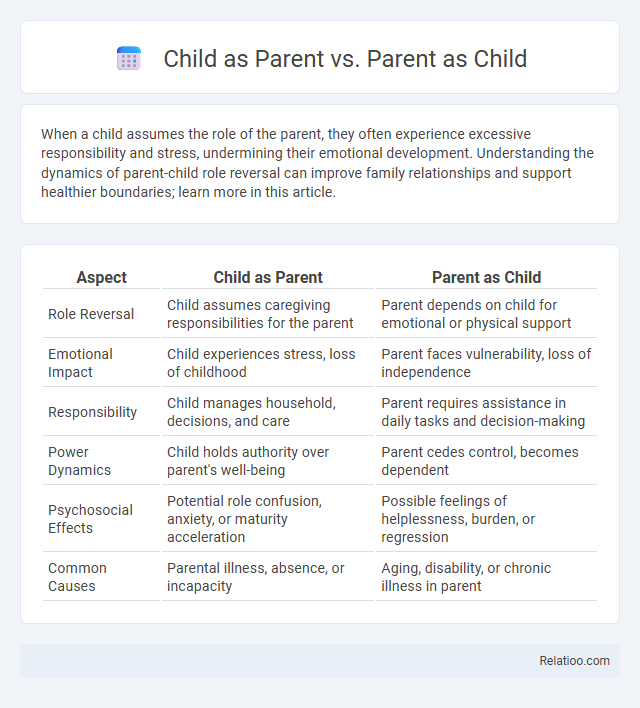When a child assumes the role of the parent, they often experience excessive responsibility and stress, undermining their emotional development. Understanding the dynamics of parent-child role reversal can improve family relationships and support healthier boundaries; learn more in this article.
Table of Comparison
| Aspect | Child as Parent | Parent as Child |
|---|---|---|
| Role Reversal | Child assumes caregiving responsibilities for the parent | Parent depends on child for emotional or physical support |
| Emotional Impact | Child experiences stress, loss of childhood | Parent faces vulnerability, loss of independence |
| Responsibility | Child manages household, decisions, and care | Parent requires assistance in daily tasks and decision-making |
| Power Dynamics | Child holds authority over parent's well-being | Parent cedes control, becomes dependent |
| Psychosocial Effects | Potential role confusion, anxiety, or maturity acceleration | Possible feelings of helplessness, burden, or regression |
| Common Causes | Parental illness, absence, or incapacity | Aging, disability, or chronic illness in parent |
Understanding the Child as Parent Dynamic
Child as Parent dynamics occur when a child assumes caregiving or decision-making roles typically reserved for the parent, often due to parental absence or dysfunction. Understanding this dynamic is crucial for addressing emotional stress and establishing healthy boundaries, as Your role shift impacts both the child's development and the parent-child relationship. Recognizing early signs of role reversal prevents long-term psychological consequences and promotes balanced relational roles.
Exploring the Parent as Child Phenomenon
The Parent as Child phenomenon occurs when an adult parent exhibits behaviors typically associated with a child, such as dependency, emotional vulnerability, or seeking validation from their children. This role reversal challenges traditional family dynamics by placing children in caregiving or decision-making positions, potentially impacting their emotional development and sense of responsibility. Understanding this dynamic can help you recognize unhealthy patterns and seek appropriate boundaries to promote healthier family relationships.
Psychological Roots of Role Reversal in Families
Role reversal in families often stems from unmet emotional needs during childhood, where the child adopts parental responsibilities to fill caregiving voids, leading to blurred boundaries between child and parent roles. Psychological roots involve attachment disruptions and coping mechanisms where children develop hyper-responsibility to maintain family stability. These dynamics contribute to internalized stress, impaired identity development, and challenges in later relationships due to the early assumption of adult roles.
Signs of Role Reversal in Parent-Child Relationships
Role reversal in parent-child relationships often manifests through signs such as the child assuming caregiving responsibilities traditionally held by the parent, emotional dependency shifting from parent to child, and blurred boundaries where the child makes decisions typically reserved for adults. You may notice your child frequently providing emotional support during your stress or managing family issues prematurely, indicating disrupted developmental roles. Recognizing these signs early can prevent long-term psychological consequences and restore a healthy parent-child dynamic.
Emotional Impacts on Children Acting as Caregivers
Children acting as caregivers experience heightened stress, anxiety, and emotional burden due to role reversal, where the parent becomes dependent on the child. This dynamic disrupts typical parent-child boundaries, leading to feelings of confusion, guilt, and loss of childhood among these young caregivers. Emotional impacts often include chronic worry, diminished self-esteem, and difficulty forming healthy relationships later in life.
Challenges Faced by Parents Behaving as Children
Parents behaving as children often confront challenges related to disrupted authority and blurred boundaries, which can undermine family dynamics and emotional stability. This role reversal may lead to increased stress and confusion for both the parent and their child, complicating effective communication and decision-making. Your ability to maintain clear roles and establish consistent expectations is crucial for fostering a healthy and supportive family environment.
Long-Term Effects of Parentification
Parentification, where a child assumes adult responsibilities typically belonging to a parent, can lead to long-term emotional challenges such as anxiety, depression, and difficulty establishing boundaries in relationships. When the parent-child roles reverse, the child's development may be hindered by chronic stress and a persistent sense of obligation, affecting your ability to form healthy attachments. Long-term effects of parentification often include impaired self-esteem and difficulties in managing personal needs separate from caregiving duties.
Strategies for Restoring Healthy Family Roles
Restoring healthy family roles in cases of Child as Parent, Parent as Child, and Role Reversal requires establishing clear boundaries, reinforcing age-appropriate responsibilities, and promoting open communication. Therapeutic interventions such as family therapy and individual counseling help address emotional imbalances and reestablish parental authority. Consistent routines, emotional validation, and empowering parents through education are critical strategies for reversing dysfunctional dynamics and fostering balanced family roles.
Supporting Children in Role-Reversed Families
Supporting children in role-reversed families involves recognizing the emotional and developmental challenges when a child assumes parental responsibilities or a parent adopts childlike behaviors. You can provide stability and boundaries that promote healthy growth, ensuring children are not overwhelmed by adult roles prematurely. Access to counseling and age-appropriate communication strengthens family dynamics and supports the child's well-being.
Seeking Professional Help for Family Role Issues
Seeking professional help for family role issues such as Child as Parent, Parent as Child, and Role Reversal is crucial to restoring healthy boundaries and communication patterns. Therapists specializing in family dynamics can provide strategies tailored to your unique situation, focusing on rebuilding trust and appropriate role functions. You benefit from expert guidance that addresses underlying causes and promotes emotional balance within the family system.

Infographic: Child as Parent vs Parent as Child
 relatioo.com
relatioo.com